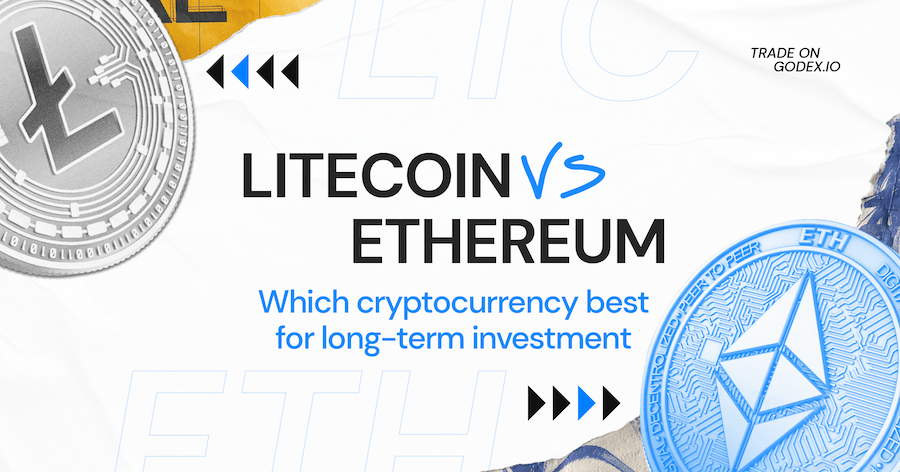Table of Contents
If you’re surveying the options to diversify your portfolio and Litecoin vs Ethereum are on your radar, then you’re in the right place. Technically, both are pretty similar but yet they differ in many aspects. In this piece, we’ll reveal the most significant ones. Therefore, you’ll be able to pick the project that meets your needs the most. Take a look.
What is Litecoin?
If you google, you’ll find out that Litecoin is a further Bitcoin spinoff, created in 2011. It is a p2p cryptocurrency and open-source software project. Actually, both were created to address the shortcomings of Bitcoin, yet in technical details, they are nearly identical.
Its founder, Charlie Lee, is a former Google employee. He wanted something similar but faster. Litecoin is 4 times faster than Bitcoin (2.5 minutes vs 10 mins for the same charge) and exploits the mechanism called “scrypt”. It is more optimal in terms of resource efficiency. It needs less energy and features a function of obtaining a key based on the password.
In this Litecoin vs Ethereum race, LTC is good to go in everyday life, with small transactions like getting a cup of coffee after jogging in the morning. It was created as an affordable currency, with the highest supply level of 84 million coins – unlike Bitcoin’s one of 21 million coins.
What is Ethereum?
Ethereum saw the world in 2015 as a blockchain platform with its native crypto – Ether. It is a decentralized application platform that welcomes cryptos, which makes it different from Bitcoin. The latter is a crypto platform. Ethereum administrates smart contracts, which represent a code that runs and performs on the blockchain.
Smart contracts enable the self-execution of proven transactions and deals between anonymous sides without the inbetweening of one controlling system. It streamlines monetary exchanges or any other manipulations (for example, property transfer, shares, or any item of value) that are defined by the rules of every contract.
The Ethereum blockchain works with NFTs, digital assets that represent real-life objects, such as music, art, videos, and in-game items. They are individual tokens that you and I can invest in, and our digital record stays on the blockchain.
Obviously, Ethereum is also faster than Bitcoin (can be mined every 10 to 20 seconds). Therewith, the number of Ether to be transacted is not limited. Additionally, in terms of costs of Litecoin vs Ethereum, Litecoin charges $0.05 per transaction and Ethereum – zero as it simply doesn’t use transaction fees but rather gas ones. Hence, when someone is sending Ether tokens, they are charged a gas fee which is up to $0.85.
In case you don’t know, gas is a unit that defines the volume of computational power needed to deliver on the transaction.
Litecoin vs Ethereum: Block time
When it’s about mining, both are better at this than Bitcoin. It’s less cumbersome to mine blocks here. Litecoin and Ethereum use Proof-of-Work mining, while the latter is in the process of switching to Proof-of-Stake.
Ethereum brags about faster mining than the one of Litecoin. So are its transactions. Litecoins ones get engaged into newly mined blocks, which decreases their speed. Thus, if regarding Litecoin vs Ethereum for small transactions, Ethereum turns out more convenient.
Now, a few words about Proof-of-Stake…This year, the team has already tested the transition on a testnet called beacon. It showed that this kind of validation process significantly reduced the energy for approving a block of transactions. This way, developers try new things before launching on the main blockchain and get time to make critical tweaks.
Litecoin vs Ethereum: Security
This point comes down again to the Proof of Work. This algorithm suggests the exploitation of computational effort to solve a cryptographic equation to add a novel block to the chain. Technical approaches can differ, but there’s a common rule for all having PoW. It says that a hacker should obtain 51% of the whole system’s computing power to compromise blockchain security.
Litecoin vs Ethereum: Total Supply
To keep the tokens in shortage, their issuers establish limits that define how many there are in circulation at the moment. Litecoin is limited to 84 million coins. Once it hits this bar, no extra coin will be released. In the Ethereum vs Litecoin competition, the first one is limitless, it can be mined ‘til the world ends’.
In the meantime, the amount mined within a year is strictly limited. It allows only 18 million to be minted in order to comply with a supply growth model. Thanks to this model, the next generations will be able to have a stable supply of coins and benefit from the demand stimulus.
What is the difference between Litecoin and Ethereum?
Besides those differences already mentioned, here are a few others. Litecoin is crypto, a transactional supplement, and a spinoff of Bitcoin, in the first place. It is also a fork of Bitcoin. Litecoin vs Ethereum took different courses of development. Litecoin is a more affordable and faster version of Bitcoin. Ethereum draws attention due to the opportunity to develop more apps.
Ethereum is on the rise. At present, it’s the second largest digital asset after BTC, manifesting how deeply the community is into Ethereum and its long-term apps. It offers more value to users, such as hosting apps, transferring items, and communication. Now, the support of NFTs became mainstream and added another value to Ethereum fans.
What is the similarity between Litecoin and Ethereum?
Both run on open-source networks, delivering access to anyone who’s into cryptos. Both require less energy for the mining process. Recently, Bitcoin became almost inaccessible because of expensive mining costs and a steep surge in value.
Another common thing between Litecoin vs Ethereum is confirmation time. It is almost the same taking less than a minute to validate the transaction. Obviously, the network’s traffic influences the speed, in general, confirmation time is way faster than Bitcoin’s one.
Conclusion
Ethereum as a project and platform has more significant fundamentals and developments than Litecoin. The latter is geared more towards transactions and trading, while Ethereum allows different types of exchange and application development. This is actually clear from LTC vs ETH caps, with no limits versus 84 million coins respectively.
The speed of Ethereum’s blockchain is way better, which adds to faster transactions and lower mining expenditures. It also has less significant block rewards for validators, which restrains supply. Litecoin, in the meantime, requires affordable transaction fees.
FAQ
Is Ethereum a good investment?
It is down more than 60%. Although it has great disadvantages, Ethereum is a risky investment. Experts do not see any signs of ‘getting back in the saddle’ any time soon. Even if it breaks through, the chances are huge for it to experience extreme volatility on this journey.
Which has more potential Litecoin or Ethereum?
Regarding Litecoin vs Ethereum value and functionalities, the latter has more potential. When it’s finished with the transition of POS, things will get even better. NFTs also contribute to its popularity as an all-around platform.
Start a Cryptocurrency exchange
Try our crypto exchange platform
Disclaimer: Please keep in mind that the content of this article is not financial or investing advice. The information provided is the author’s opinion only and should not be considered as direct recommendations for trading or investment. Any article reader or website visitor should consider multiple viewpoints and become familiar with all local regulations before cryptocurrency investment. We do not make any warranties about reliability and accuracy of this information.
 Alex Tamm
Alex Tamm 
Read more
Ripple (XRP) price has been widely discussed by the cryptocurrency community since it has gained public interest in 2017, even though it was founded by Chris Larsen and Jed McCaleb years before. The platform offers innovative blockchain solutions for the banking sector and has the potential to disrupt the whole finance industry. In recent years, […]
In this article we will talk about Ripple (XRP) and its price prediction. What is Ripple (XRP) Ripple is a San Francisco-based startup that was launched in 2012 by Ripple Labs as a global network both for cross-currency and gross payments. Ripple history began in 2004 with the discussions around the digital coin in the […]
You may well think that an article dedicated to a Tether price prediction or the Tether price in general is a little bit strange — it is a stablecoin after all. However, the price of Tether does fluctuate significantly, although it is nowhere near as volatile as non-stablecoin cryptos. This means that staying up to […]
In the article we share our vision at Zcash cryptocurrency main features and add several price predictions. As cryptocurrencies gain global acceptance and decentralisation slowly enters our lives, privacy becomes the main concern when talking about blockchain adoption. It is no secret that distributed ledger is by far the most secure and transparent technology ever […]
Chiliz coin (CHZ) offers a compelling opportunity for traders interested in the intersection of blockchain technology and sports. By enabling fans to influence team decisions through the Socios app, Chiliz directly monetizes fan engagement and connects with major sports teams like Juventus and Paris Saint-Germain. These partnerships not only enhance the platform’s visibility but also […]
The exponential growth of Bitcoin Satoshi Vision (BSV) against the general bear trend on the cryptocurrency market in autumn 2019 has impressed the community. Due to the increasing market capitalization, the newly emerged altcoin was ranked 5th on CoinMarketCap and managed to maintain its high position at the beginning of 2020. In the article we […]